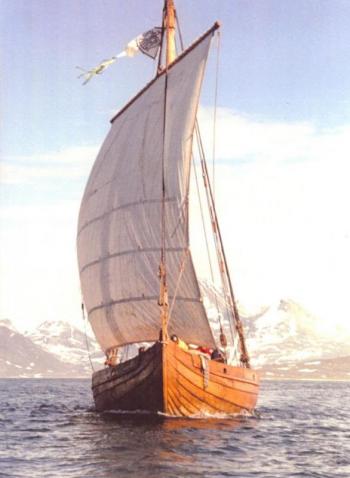Maine’s First Ship announces spring lecture series
Maine’s First Ship is pleased to announce its second annual lecture series on 17th century maritime and colonial history. Four presentations, beginning March 22, focus on shipbuilding, tides, Native American place names, and traditional rigging.
MFS Vice-President Jeremy Blaiklock of Arrowsic decided to organize the series after attending the colonial re-enactment at Pemaquid a few years ago. “I realized that there is a lot of knowledge out there that Maine's First Ship could share with the public," he said. MFS Board member and volunteer Lori Benson has organized this year’s series, which will be held at the Winter Street Church at 880 Washington Street, Bath.
On Thursday, March 22 at 7 p.m., Rob Stevens talks about one of his favorite projects, “Building a Viking Ship in Maine and Sailing in the Wake of Leif Ericsson.” In 1996, Stevens and a crew of what he calls “joyful shipwrights” built a Viking knar at his boatyard on Hermit Island in Phippsburg. He and a group of men with varying levels of sailing knowledge sailed her from Greenland to Newfoundland to commemorate the 1000th anniversary of Leif Ericsson’s voyage to the New World. Stevens is Virginia’s shipwright and has been building and repairing wooden boats for over 30 years. He’s worked on ships as far afield as Los Angeles and Galveston, and as local as Bath.
Second in the series is MFS rigger, Jim Nelson on Sunday, April 8 at 2 p.m., with a discussion of traditional rigging tools. In “The System is Rigged!: The Art of Rigging in the Age of Sail,” Nelson describes tools such as serving mallets and palms and fids and marlin spikes, which he says “are little known to the modern observer.” In contrast, tools used in reconstructing Virginia would be recognized by most people today. Saws, hammers, chisels, and planes may have become electrified in the past 400 years, but they are still essentially the same tool. Nelson also discusses how sails and rigging worked in a 17th century vessel and also provide hands-on demonstrations of some of the ancient techniques being used on Virginia today.
The third presentation will be Thursday, April 26 at 7 p.m. Joe Hall, who teaches colonial, American Indian, and environmental history at Bates College, is currently researching the history of Wabanakis, Maine's indigenous peoples, and is particularly interested in the ways that Wabanakis continued to cultivate ties to their homeland even as colonial peoples sought to dispossess them of it. In his presentation, "What does Winnegance Mean? Wabanaki Place Names in Context," Hall speaks about the ways that Wabanaki place names offer some clues not only to how Wabanakis inhabited their homelands before colonists' arrival but also how they continued to inhabit those lands in the midst of colonization.
Last in the series is a talk on tides on Sunday, May 6, at 2 p.m. In “Tidal Predictions, Tidal Patterns, and Tidal Power: How the Ebbs and Flows Affect Your Life,” MFS volunteer Jim Parmentier will review the fundamental principles of tidal generation and prediction, describe some of the effects of tidal patterns on biological diversity, and discuss efforts currently underway to harness tidal power for electrical generation. Ocean tides are primarily caused by gravitational attractions between the earth and the moon. But the observed tide levels and current flows at any particular location depends on the interactions of ocean tides with local geographies, weather-related events, and celestial positioning. Trained as a biologist and experienced as a coastal sailor from the Carolinas to Cobscook Bay, Parmentier describes how to recognize, predict and exploit tidal movements to best advantage.
Public welcome; suggested donation of $5.






























